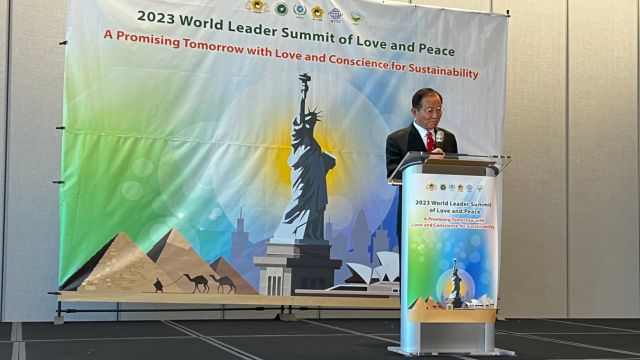The path to tolerance has been slowly built through human history. More recently, Dr. Hong and Tai Ji Men decisively contributed to it.
by Thierry Valle*
*A paper presented at the webinar “Tai Ji Men: Affirming the Core Value of Tolerance,” co-organized by CESNUR and Human Rights Without Frontiers on November 16, 2023, International Day for Tolerance.
An article already published in Bitter Winter on November 21st, 2023.

The International Day for Tolerance, celebrated each year on 16 November, reflects humanity’s collective commitment to promoting understanding, respect, and acceptance across diverse cultures and societies. This day is an opportunity to reflect on the historical journey that led to the establishment of this crucial celebration.
The origins of the International Day for Tolerance can be traced back to the United Nations Educational, Scientific and Cultural Organisation (UNESCO). In 1995, UNESCO Member States adopted the Declaration of Principles on Tolerance, underlining the importance of tolerance in building lasting peace and preventing conflict. This declaration served as a catalyst for the official recognition of an international day dedicated to the promotion of tolerance.
The principle of tolerance has a rich and varied history spanning several centuries, reflecting the changing attitudes of societies towards diversity and difference. Tolerance as a concept has its roots in philosophy, religion, and political thought, and its application and understanding adapt to changing social, cultural, and political landscapes. The following is an overview of the historical development of the principle of tolerance.
1. Ancient philosophical roots: The idea of tolerance can be traced back to ancient Greek philosophy. Thinkers such as Socrates, Plato, and Aristotle discussed the importance of open-mindedness, intellectual diversity, and acceptance of different perspectives. The Socratic dialogue, for example, is a form of discourse that encourages the exploration of ideas without hostility.
2. The Enlightenment Era (Siècle des Lumières):The Enlightenment period of the 17th and 18th centuries saw a surge in the promotion of reason, individual rights, and religious freedom. Thinkers such as John Locke argued in favour of religious tolerance, believing that governments should not impose a particular religion on citizens. His ideas influenced the development of constitutional principles on the separation of church and state.
3. The Peace of Westphalia (1648): The Peace of Westphalia, which ended the Thirty Years’ War in Europe, is often seen as a turning point in political tolerance. The treaties recognized the sovereignty of individual states, allowing them to determine their own religious practices. This marked a break with the era of the wars of religion and contributed to the idea of coexistence between different religious communities.

4. The American experience: The founding principles of the United States, enshrined in documents such as the Constitution and the Bill of Rights, embody a commitment to tolerance. The First Amendment, in particular, guarantees freedom of religion, expression, and assembly, laying the foundations for a society that values pluralism and individual freedoms.
5. The post-World-War-II era of human rights: The atrocities of the Second World War led to a global reappraisal of human rights and tolerance. The Universal Declaration of Human Rights, adopted by the United Nations in 1948, emphasized equality, non-discrimination, and the right to freedom of thought and religion, thus contributing to the international recognition of tolerance as a fundamental principle.
6. Contemporary challenges and progress: Tolerance remains a dynamic and evolving principle. Contemporary challenges, including issues of race, gender, sexual orientation, and religious diversity, underline the continuing need for societies to promote tolerance and inclusion. Movements for social justice and equality underline the importance of accepting differences and fostering understanding.
7. Religious and spiritual contributions: Many religious and spiritual traditions have played a key role in shaping the principle of tolerance. For example, various teachings from Hinduism, Buddhism, Judaism, Christianity, and Islam emphasize compassion, understanding, and respect for others. The Golden Rule, which advises treating others as you would like to be treated yourself, is a common thread running through many religious doctrines and contributes to the ethic of tolerance.
I would like to end my presentation by giving you some examples of the contributions to peace and tolerance offered by Dr. Hong Tao-Tze, the Shifu (Grand Master) of Tai Ji Men.
Since 1966, Dr. Hong’s spiritual teachings have helped to spread the idea of tolerance, which promotes peace and harmony.
In 1999, Dr. Hong and his organisation FOWPAL (Federation of World Peace and Love) launched a campaign for peace and consciousness. For more than twenty years, Dr Hong and his dizi (disciples) have visited 103 countries and met with the world’s top leaders to promote peace, love, and conscience.
In 2019, their efforts were rewarded by the 25 July UN resolution establishing April 5 as the International Day of Conscience.
The resolution at point 2 “emphasizes that the International Day of Conscience constitutes a means of regularly mobilizing the efforts of the international community to promote peace, tolerance, inclusion, understanding and solidarity, in order to build a sustainable world of peace, solidarity and harmony.”
The establishment of this international day is a major contribution to peace and tolerance between peoples.
Today, more than ever, we need this tolerance that will lead us to peace.

On 13 October, Dr. Hong gave a speech in Pasadena/Arcadia at the “A Promising Tomorrow with Love and Conscience for Sustainability” World Leader Summit of Love and Peace, and I will conclude with some words from his speech:
“We hope that everyone will be guided by conscience in their respective roles and dedicate themselves to spreading love throughout the world to foster a culture of conscience that benefits all of humanity.
Let’s save our only home and pave the way for a peaceful and sustainable future.
May all people follow their conscience and practice love and peace to create world peace for present and future generations.”
